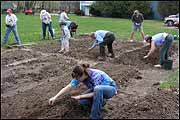New York UUs reaping bountiful harvest
Organic gardening project distributes fresh produce to food pantries.
The arrival of this fresh, organically grown produce is the result of the Unitarian Universalist Church of Canton’s new UShare gardening program that grows and distributes organically grown produce to 16 local, St. Lawrence County food banks. The program, which is in its second year, yielded more than 2,200 pounds of produce last year that was distributed to 22 food pantries. This year the produce included tomatoes, beans, peppers, cabbage, squash, broccoli, onions, Brussels sprouts, eggplant, pumpkins, leeks, kohlrabi, beets, and watermelon.
Church members tend two garden plots. The smaller garden, right behind the church in Canton, is 40 by 20 ft. The larger one, ten miles away in Potsdam, N.Y., is 60 by 70 ft.
The work is largely done by the 200-member congregation but has drawn in members of the community as well. A group from First Presbyterian Church in Potsdam adopted the garden in August for a week. Students from the State University of New York at Potsdam have also supplied labor. “Sometimes someone will stop by while we’re working and ask about the garden and end up volunteering to help,” said David Bradford, cochair of the garden coordinating committee.
The church chose the garden project after doing a Social Justice Empowerment Workshop with the Rev. Dick Gilbert in the fall of 2004 that helped the congregation choose a social justice project that everyone could support. As a result of the workshop, a small group of congregants came up with the idea of a garden based on the Garden Share program in northern New York State that promotes the growth and distribution of locally grown organic food to mitigate hunger in the area. They brought the idea for the project before the congregation for a vote, and it was resoundingly endorsed. The gardens do get a modest amount of financial support from the church, but a large percentage of the supplies and all of the labor is donated.
Approximately 75 congregants are involved in some aspect of gardening or the distribution of the produce, Bradford said. The congregation’s children have done their part as well, especially in the smaller garden behind the church. “There were a number of times when an RE class would come out for specific tasks, such as for weeding and harvesting,” he said.
Hunger is an issue in St. Lawrence County, with 17.5 percent of the residents living in poverty, according to data provided by the Nutrition Consortium of New York State. The church has also helped arrange for food stamps to be accepted at the Canton farmer’s market held twice a week. This gives lower income consumers greater access to healthy food.
“We make a special effort to get to food pantries in remote places,” said Kathy Wyckoff, the garden’s volunteer coordinator. Since St. Lawrence County is the biggest county in New York State, this can involve driving as many as 40 miles. “We usually make an appeal to get people who would be going to that area anyway to deliver the produce,” Wykoff said. “This way, we can conserve energy.”
“People are very excited about this,” said Lorraine Taylor, head of the Gouverneur Neighborhood Center, one of the places receiving the produce. “We have some people living in apartments and some of the elderly who can’t do their own gardening.”
Wyckoff agrees that there’s satisfaction in actually delivering the fresh produce. “My favorite part is making a delivery—walking into these food pantries with tomatoes or eggplant and watching people perk up.”
The group is hoping to expand the project in the non-growing months by providing an educational component to teach people about nutrition. They also hope to show people how they can grow some of their own produce through mini-gardens.
See sidebar for links to related resources








